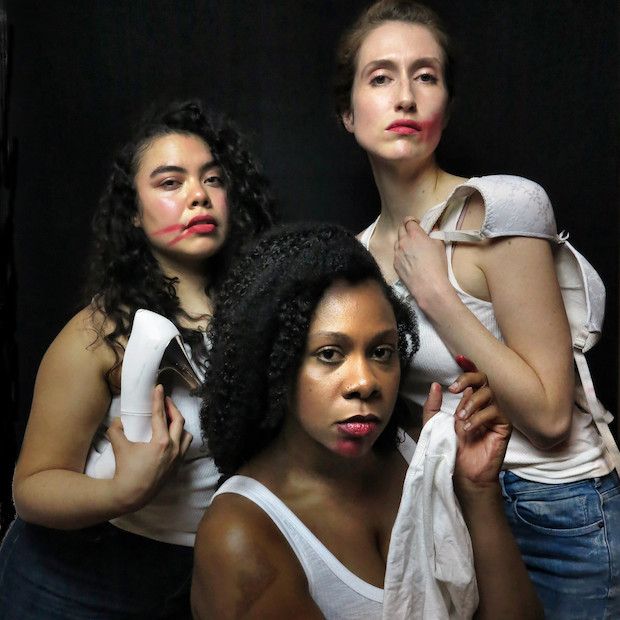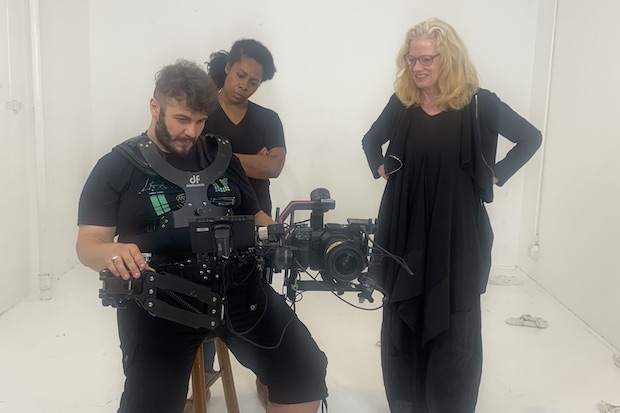Interview: How Two Downtown Theatermakers Saved Their Play From the Clutches of Covid
”Spoiled”, a series of monologues about gender-based violence, was set to play La MaMa in March 2020. You know what happened next.

(© Hess Collective)
Playwright-director Elizabeth Hess had just finished the final rehearsal of her play Spoiled when she got a call from La MaMa's artistic director, Mia Yoo, letting her know that the show (which was scheduled to perform at the fabled downtown venue March 19-29) would have to be postponed in light of the rapidly worsening Covid pandemic. "I didn't envy her having to make all those calls," Hess now says, reflecting on those unpredictable weeks that upended everyone's lives.
"We were about to go into tech," recalls Cherrye J. Davis, one of the three performers of the piece, which presents a series of monologues about gender-based violence from the male perspective (but using only women as actors). What originally seemed like a pause of three to six weeks stretched into months, and Davis had the idea to turn the play into a film, thereby preserving the work while also presenting it to an audience that might not have been able to mosey on down to East 4th Street. Hess not only agreed, but brought Davis on as co-director.
This past March, one year after Spoiled was set to debut, Spoiled: The Film Project, Chapter One streamed through La MaMa's website. Davis and Hess just wrapped filming on the second chapter with the two other performers (Rebeca Miller and Ninoshka De Leon Gill) and director of photography Catalin Stelian. It is set to debut before the end of the year.
I sat down for a Zoom conversation with Hess and Davis to learn how they kept Spoiled from being spoiled. Full disclosure: Elizabeth was a favorite professor at NYU and Cherrye designed the costumes for my senior thesis, an extra-gay production of Little Shop of Horrors. It was great to hear how they not only survived, but thrived through the pandemic. Like a lot of artists, they have found great bursts of creativity within the limitations of the past year.

(© Hess Collective)
Where did Spoiled come from?
Elizabeth Hess: I was commissioned, originally. I had done a piece called Dust to Dust on systematic wartime rape. I performed it for the UN Conference on Gender Violence, and I was approached afterward by Elizabeth Scott Osbourne, a chapter president of UN Women USA, asking if I would do a new piece. I had just done a harrowing piece from the woman's point of view, so I wanted to do it from the male point of view if I was going to do it.
Since #MeToo there has been a lot of discourse about "centering" the voices of women when we talk about issues like gender-based violence. You've taken the opposite approach and all of your characters are men. Why?
Elizabeth: I did not want to write another victim piece. Women all understand these issues. Unfortunately, many many many of us have had some relationship to violence. I wanted to unpack the male psyche that would lead to such destructive behavior. By writing from the male point of view, but having it performed by women, I'm not appropriating male experience. I'm trying to unpack it as a woman, through a woman's voice.
The three male characters you feature in Chapter One are all sympathetic in their own ways. Was that important to you?
Elizabeth: It's important for me not to demonize men. And to show that they are complex and layered and products of the culture as well. In many ways, this piece is really not so much about men and women as it is about patriarchy and power imbalance. And that power imbalance distorts men and boys also. Part of my reason for doing this from the male point of view is that we're not going to get anywhere if we write men off. We need to start to unpack this behavior if we want to see anything change.
Cherrye J. Davis: Every time we tackle a new piece, that becomes the question: What tools could have prevented this situation? What could have happened differently? It's interesting to think about that not just for the individual, but for an entire system that enables this dysfunction — where you as a man have to behave in a certain way or else your body can be in danger too.
How did you go about turning a preexisting stage play into a new film?
Cherrye: With a stage show, you have the suspension of disbelief. You have this one body incorporating many bodies and stories for the purpose of reaching this larger conversation. When we got shut down by Covid, the conversation became, "Hey, can this be an opportunity to take these stories and bring them to a wider audience?" Also, "How do you present the intimacy of theater on film?" I'm someone who loves embodied performance, especially when it comes to a lot of hip-hop performers. Marc Bamuthi Joseph is one of my favorites, but I was heavily influenced by the filmed dance works of Pina Bausch. There is a lot more to it than just putting a camera on a stick.
Will Chapter Two follow the same characters?
Cherrye: It's three new characters, but the same performers. Though we are still talking about gender-based violence, we are going to tackle some slightly different nuances in Chapter Two. We are having conversations around violence against trans women. We are talking about the overlap of gender-based violence and white supremacy. We're having conversations about ritual and tradition as it plays into gender-based violence. This is all building off the first chapter.
And it's all building off your shift from stage to screen.
Elizabeth: I was so pleased when Cherrye came to me with this idea. It's been a huge learning curve for me, but I'm so grateful for it.
Spoiled: The Film Project, Chapter Two will debut at LaMaMa.org on Thursday, August 5, at 7pm. The screening will be followed by a talkback titled Giving Voice to Marginalized Girls, Women and Femmes, moderated by Shonna Trinch, Professor of Gender Studies at John Jay College of Criminal Justice.








